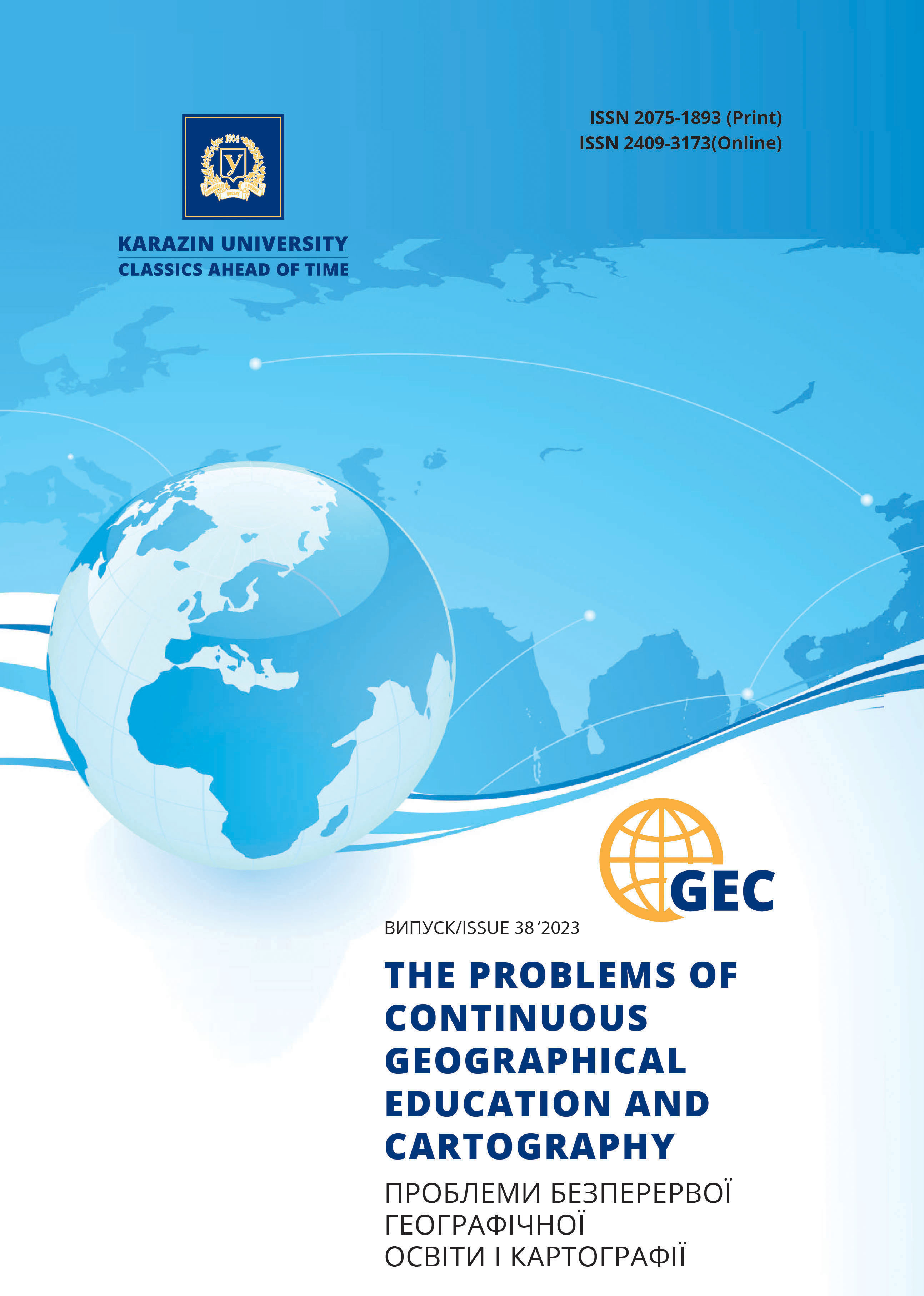Variability of the educational process when teaching the topics of the section «Topography and cartography» in the 11th form
Abstract
The purpose of the article is to determine the ways of organizing the educational activities of 11th grade students for the formation of cartographic competence within the framework of the topic «Topography and cartography» in present-day conditions of uncertainty.
Basic material. Students cannot acquire geographic competences qualitatively and efficiently provided there is no cartographic literacy as part of information and digital competence, related to the consideration of the map as a concentrated carrier of information. Not having the opportunity to expand the scope of topographic-cartographic knowledge in the content of school geography, it is necessary to pay attention to the quality of the educational process, forming topographic-cartographic knowledge, abilities and skills under different conditions of conducting educational activities. We propose to take into account the theoretical foundations of the educational process, external and internal conditions, role of topographic-cartographic knowledge in the structure of school geography. Such a model of the training organization will regard the formation of cartographic competence through learning technologies and its results, expressed in cognitive, activity and evaluation-value competences. In modern realities of Ukraine, there is a need to consider five technologies of conducting lessons: traditional face-to-face, mixed, synchronous online, synchronous consultation type without video communication, asynchronous, the modeling possibilities of which we reflected in the publication. All the mentioned technologies have a certain system of available training methods and techniques.
Conclusions and further research. All technologies for conducting classes on cartographic subjects can exist effectively. The analysis of methodical support proved that each learning technology should have its own ones, as well as methods, techniques. The proposed model of the educational process organization determines the relationship between them. The developed models of lessons using 5 technologies have showed that the modeling of educational activities is a permanent feature of a teacher’s work, especially in today’s changing world. The design of the lessons should allow you to switch quickly from face-to-face lessons to asynchronous lessons, from remote online lessons to remote consultation lessons, etc. The authors have varified the effectiveness of individual lesson models in practice and recommended them for use as an example for modeling lessons on other topics.
Downloads
References
Bezuglyi, V.V., & Lysycharova, G.O. (2021). Formation peculiarities of cartographic competence of 10th grade students by means of the geography textbook. Bulletin of Alfred Nobel University. Pedagogy and psychology. Pedagogical Sciences, 2(22), 85–92. doi: 10.32342/2522-4115-2021-2-22-10 [in Ukrainian].
Braslavska, O., Barvinok, N. (2021). Formation of cartographic competence of future geography teachers when studying disciplines of fundamental training. Psychological and Pedagogical Problems of Modern School, 1(5), 6–15. doi: 10.31499/2706- 6258.1(5).2021.234755 [in Ukrainian].
Datsenko, L.M. (2011). The cartographic component of school geographic education in the conditions of society’s informatization. Bulletin of Geodesy and Cartography, 3(72), 51–55 [in Ukrainian].
Klymenko, V.G., Prasul, Y.I., Ivanenko, L.O., Moiseyenko, R. (2020). Practical works as a component of the geography course (on the example of the 11th grade - standard level). Problems of Сontinuous Geographic Education and Cartography, 31, 34–42. doi: 10.26565/2075-1893-2020-31-04 [in Ukrainian].
Nepsha, O.V. (2022). Methodical aspects in the formation of cartographic literacy of students during the study of the school geography course. Pedagogy of Creative Personality Formation in Higher and Secondary Schools, 84, 106–110. doi: 10.32840/1992- 5786.2022.84.18 [in Ukrainian].
Nosachenko, V.M. (2016). Formation of cartographic competence of future geography teachers in the process of professional training. (Extended abstract of candidate’s thesis). Pereyaslav-Khmelnytskyi [in Ukrainian].
Kramer, C., Jahnke, H. (2019). Geographies of Schooling: An Introduction. Geographies of Schooling, 14, 1–16. Available at: https://link.springer.com/chapter/10.1007/978-3-030-18799-6_1 [in English].
Reinfried, S., Hertig, Ph. (2020). Geographical Education: How Humanenvironment-Society Processes Work. Encyclopedia of Life Support Systems. Geography. Available at https://www.eolss.net/sample-chapters/c01/e6-06b-46.pdf [in English].
Teaching Geography. An eight-part professional development workshop in geography for 7th- through 12th-grade teachers. (2002). S. Burlington: Corporation for Public Broadcasting, 67 [in English].
Teaching secondary geography. (2022). Available at: https://www.open.edu/openlearn/mod/oucontent/view.php?id=48124&printable=1 [in English].

This work is licensed under a Creative Commons Attribution 4.0 International License.





